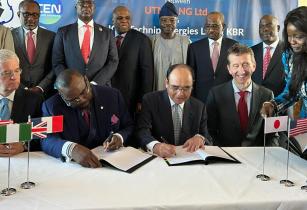UTM Floating Liquefied Natural Gas (LNG) Limited, JGC Corporation, Technip Energies and Kellogg Brown & Root (KBR) have signed a front-end engineering design (FEED) contract for the development of Nigeria’s first floating liquefied natural gas (FLNG) facility
With the signed contract, the development of the FLNG facility in block OML 204 offshore Nigeria will kick off, enabling the west African country to maximise the exploitation of stranded gas resources in a sustainable manner while contributing to the Nigerian government’s agenda of reducing flaring and optimising environmental sustainability in energy developments, according to Timipre Sylva, Minister of Petroleum Resources, Nigeria, in a speech made during the signing ceremony of the contract.
According to the minister, with factors such as a lack of investment, transportation and export infrastructure, and technological challenges disrupting Nigeria from maximising its gas industry, the FLNG project is a step forward in the right direction for the west African country to develop, exploit and monetise its over 209 tn cu/ft of proven gas resources and a potential upside of 600 tn cu/ft of gas to ensure energy security, economic growth and the reduction in emissions.
“Given the large resources that may be developed and used for commercial purposes, we have already proclaimed that gas is our transition fuel and a destination fuel, and we anticipate that it will be a major component of our energy mix by the year 2060,” said Sylva. “As a developing nation, we believe that affordable, accessible and reliable energy will continue to be essential to sustaining and powering our growing economy, and to lift millions out of poverty. As a government we know our action is essential to enable evolution of the energy system. We believe innovation, technology and policy will be the key drivers of change.
”Highlighting the role of FLNG technology in accelerating gas exploitation, he added, “We are aware that the number of offshore gas finds has surged in recent years around the world, with LNG and FLNG becoming even more important in terms of satisfying the world's future energy needs. According to market research analysts, the FLNG market is estimated to increase at a compound annual growth rate (CAGR) of 27.14%, reaching US$88.99bn by 2024. The UTM offshore FLNG project is therefore timely and will lead towards a faster-moving, more diverse and more flexible global LNG industry.”
He also gave reference to some of the mechanisms and policy reforms including the Decade of Gas, the Year of Gas and the Petroleum Industry Act implemented by the government to create an enabling environment to expand the country’s gas industry and ensure a just and inclusive energy transition.
Speaking on how Nigeria can fast track gas developments, meet its 2030 economic growth targets and growing energy demand, create jobs and bring new investments on the back of gas exploitation, the minister also highlighted the importance of collaborative partnership, commending the “African Export-Import Bank, under the leadership of its amiable president and chairman, Dr Benedict Okey Oramah, for orchestrating the signing of the Memorandum of Understanding (MoU) with UTM Offshore Limited to raise US$5bn for the development of Nigeria’s first FLNG project.”
“We opted for FLNG because FLNG was originally developed to help realise the promise of natural gas – specifically, to bring gas to the global market from small offshore fields and nearshore terminals in areas lacking infrastructure – especially pipelines. And the LNG market is stuck with traditional models that do not address the world’s demand for low cost, flexible LNG to become a preferred fuel-of-choice over coal and liquids. The world markets as we all know it today need low-cost, flexible LNG supply and has limited capacity to underpin major conventional projects. The solution, UTM Offshore believes, is a standardised FLNG that allows the costs to be 20-40% cheaper with FID thresholds of just 1.5 - 2.5 MTPA. And this is where the UTM Offshore FLNG project will hold sway, having the desired impact as well as influence,” said Julius Dediare Rone, CEO and chairman of UTM Offshore.





